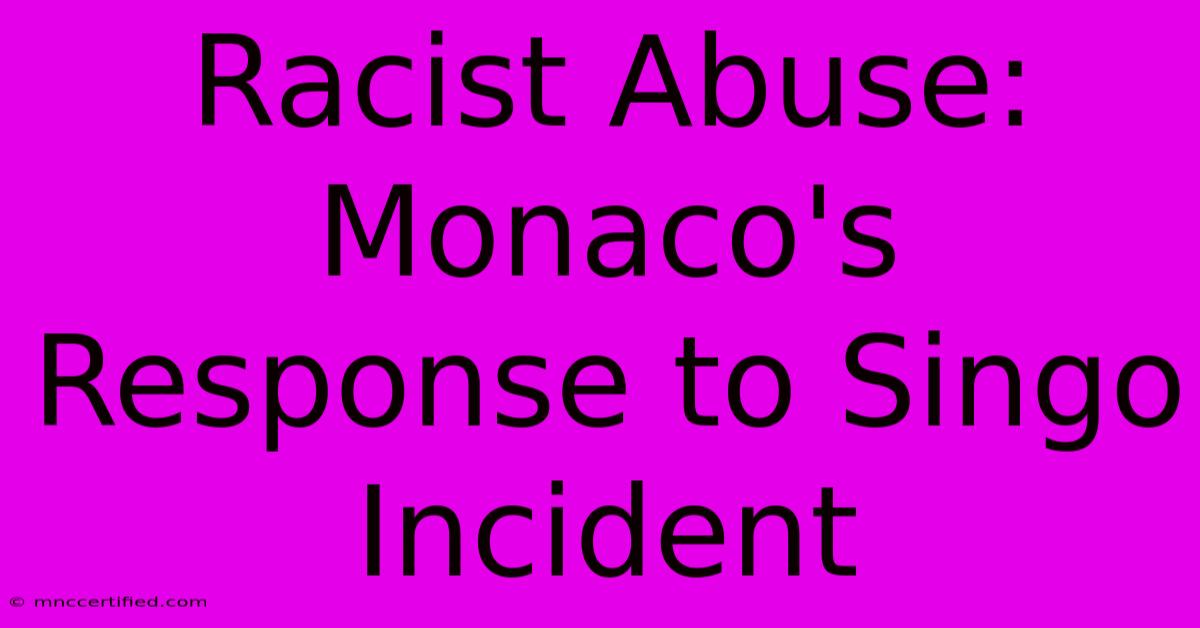Racist Abuse: Monaco's Response To Singo Incident

Table of Contents
Racist Abuse: Monaco's Response to the Singo Incident – A Critical Analysis
The recent racist abuse targeted at Torino's midfielder, Ola Aina, during a Serie A match against AS Monaco has sparked widespread condemnation and calls for stronger action against racism in football. This incident, involving alleged monkey chants directed at the Nigerian international, highlights the persistent problem of racism in sports and the critical need for effective preventative measures and robust disciplinary actions. This article delves into the specifics of the Singo incident, Monaco's official response, and the broader implications for combating racism in football.
The Singo Incident: A Detailed Account
While the specific details might vary depending on the source, the core issue remains the same: Ola Aina, while playing for Torino against AS Monaco, was subjected to what many witnesses and the player himself described as racist chants from a section of the Monaco supporters. The alleged monkey chants, a particularly vile form of racist abuse, created a hostile and offensive atmosphere. This incident wasn't just an isolated event; it underscores the systemic nature of racism within football stadiums across the globe. The lack of immediate action by match officials during the game further fueled the outrage.
Many sources reported a delay in addressing the situation, raising questions about the effectiveness of existing protocols for dealing with racist incidents in real-time. This delay is a significant factor, as swift intervention is crucial in deterring further abuse and sending a clear message that such behavior is unacceptable. Social media erupted with condemnation, highlighting the global reach and impact of such incidents.
Monaco's Official Response: Insufficient or Effective?
AS Monaco's official response to the incident has been met with mixed reactions. While the club issued a statement condemning all forms of discrimination, many critics argue that the response lacked the necessary strength and commitment to addressing the root causes of the problem. The specific actions taken by Monaco following the incident, or lack thereof, are key to evaluating the sincerity and effectiveness of their response.
Many are calling for more concrete actions beyond generic statements, such as:
- Thorough investigations: A comprehensive investigation to identify and sanction the individuals responsible for the racist chants.
- Stadium bans: Issuing life-long bans to those identified as perpetrators.
- Educational programs: Implementing comprehensive anti-racism education programs for players, staff, and fans.
- Increased security measures: Improving security measures within the stadium to prevent and quickly respond to racist incidents.
- Collaboration with anti-racism organizations: Actively collaborating with organizations dedicated to fighting racism in football.
The absence of any of these actions leaves many feeling that Monaco's response was merely a superficial attempt at damage control rather than a genuine commitment to tackling racism within their club and fanbase.
The Broader Context: Racism in Football and Beyond
The Singo incident isn't isolated; it reflects a broader problem of racism within football and society at large. Football, with its global reach and passionate fanbase, has a significant responsibility to combat racism effectively. The lack of consistent and robust action against racist incidents sends a dangerous message: that such behavior is tolerated. This needs to change.
The failure to adequately address racist abuse can have serious consequences, including:
- Damaging the reputation of the sport: Such incidents create a negative image of football and deter fans and sponsors.
- Creating a hostile environment for players: Racist abuse makes it difficult for players of color to feel safe and respected on the pitch.
- Perpetuating harmful stereotypes and prejudices: Racist abuse reinforces harmful stereotypes and prejudices that have no place in society.
Moving Forward: A Call for Stronger Action
The Singo incident serves as a stark reminder of the urgent need for stronger action against racism in football. It’s not enough for clubs to simply issue statements; they must actively work to create a culture of respect and inclusion within their organizations and fan bases. This requires a multi-pronged approach involving strong disciplinary measures, educational programs, and increased collaboration between clubs, governing bodies, and anti-racism organizations. Only through a concerted and sustained effort can we hope to eradicate racism from the beautiful game and create a truly inclusive sporting environment for all.
Keywords: Racist Abuse, Monaco, Ola Aina, Singo Incident, Serie A, Racism in Football, Anti-racism, Football Discrimination, Disciplinary Action, Stadium Bans, Anti-racism Education, Combating Racism
Off-Page SEO Strategies: Promote this article through social media, share it on relevant football forums and websites, and build backlinks from reputable sports news sites and anti-racism organizations.

Thank you for visiting our website wich cover about Racist Abuse: Monaco's Response To Singo Incident. We hope the information provided has been useful to you. Feel free to contact us if you have any questions or need further assistance. See you next time and dont miss to bookmark.
Featured Posts
-
Fani Willis Removed From 2020 Case
Dec 20, 2024
-
Amazon Faces Union Holiday Pickets
Dec 20, 2024
-
James Gunns Superman New Trailer Krypto
Dec 20, 2024
-
Broncos Vs Chargers Betting Guide Tnf
Dec 20, 2024
-
Arenado Astros Trade Reasons For Refusal
Dec 20, 2024